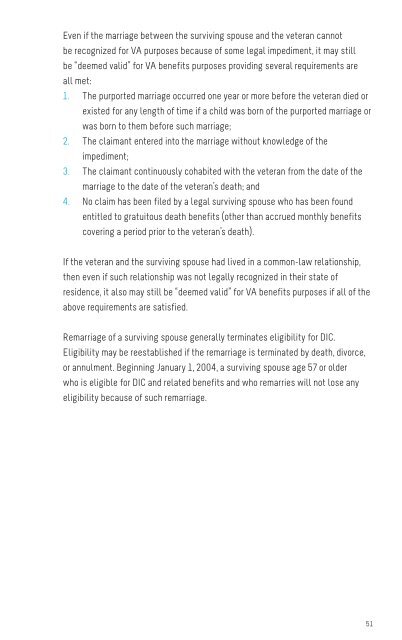Veteran_ Resource_ book_2014
Veteran_ Resource_ book_2014
Veteran_ Resource_ book_2014
Create successful ePaper yourself
Turn your PDF publications into a flip-book with our unique Google optimized e-Paper software.
Even if the marriage between the surviving spouse and the veteran cannot<br />
be recognized for VA purposes because of some legal impediment, it may still<br />
be “deemed valid” for VA benefits purposes providing several requirements are<br />
all met:<br />
1. The purported marriage occurred one year or more before the veteran died or<br />
existed for any length of time if a child was born of the purported marriage or<br />
was born to them before such marriage;<br />
2. The claimant entered into the marriage without knowledge of the<br />
impediment;<br />
3. The claimant continuously cohabited with the veteran from the date of the<br />
marriage to the date of the veteran’s death; and<br />
4. No claim has been filed by a legal surviving spouse who has been found<br />
entitled to gratuitous death benefits (other than accrued monthly benefits<br />
covering a period prior to the veteran’s death).<br />
If the veteran and the surviving spouse had lived in a common-law relationship,<br />
then even if such relationship was not legally recognized in their state of<br />
residence, it also may still be “deemed valid” for VA benefits purposes if all of the<br />
above requirements are satisfied.<br />
Remarriage of a surviving spouse generally terminates eligibility for DIC.<br />
Eligibility may be reestablished if the remarriage is terminated by death, divorce,<br />
or annulment. Beginning January 1, 2004, a surviving spouse age 57 or older<br />
who is eligible for DIC and related benefits and who remarries will not lose any<br />
eligibility because of such remarriage.<br />
51


